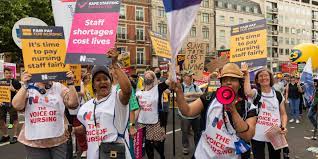By Charlotte Webster-
A 48-hour strike by nurses in England over the Bank Holiday weekend will be cut short by a day after a High Court judge ruled it was partly unlawful.
The walkout in a row over pay by the Royal College of Nursing, due to start on Sunday will now end on Monday.
Health Secretary Steve Barclay took legal action after NHS Employers said the last day of the planned strike was not covered by the mandate as the ballots closed on 2 November at midday.
. The strikes were being carried out in protest of low pay and poor working conditions, which have long been a contentious issue in the healthcare sector.
Nurses in the UK have been campaigning for better pay and working conditions for many years. They argue that their work is undervalued and that they are not paid adequately for the important work they do. This has led to low morale among nurses and has made it difficult for hospitals and clinics to retain staff.
In addition to low pay, nurses have also been highlighting the poor working conditions they have to endure. Many have reported working long hours without breaks, being forced to work in understaffed units, and having to work with inadequate resources.
To protest against these issues, nurses have been going on strike across the country. However, their actions have been met with mixed reactions from the public and healthcare providers.
The High Court Ruling
The strikes were cut short after a High Court ruling that deemed them unlawful. The ruling stated that the strikes were in breach of the Trade Union and Labour Relations Act of 1992, which prohibits strikes that have the potential to cause significant harm to patients.
Judge Mr Justice Linden ordered the RCN to pay the costs of the hearing, saying the union had showed “a high degree of unreasonableness”, the outcome was “inevitable” and “instead of grasping the nettle and conceding” it had forced the case to court.
After the hearing, the RCN’s general secretary Ms Cullen said: “They [the government] have won their legal battle today. But what this has led to is they have lost nursing and they’ve lost the public.
“They’ve taken the most trusted profession through the courts, by the least trusted people.”
The decision to cut the strikes short was met with disappointment by many nurses, who argue that they have no other choice but to take action to bring attention to their grievances. However, the judge’s comments shed some light on the reasoning behind the ruling.
Justice Lindon, who presided over the case, the strikes posed a significant risk to patient safety. In his ruling, he stated that “the potential adverse consequences for patient safety and welfare, in particular, are of such gravity that they outweigh the damage which would be caused to the union’s right to strike.”
The judge ordered the RCN to pay the costs of the hearing, saying the union had showed “a high degree of unreasonableness”, the outcome was “inevitable” and “instead of grasping the nettle and conceding” it had forced the case to court.
After the hearing, the RCN’s general secretary Ms Cullen, attacked the government for taking nurses to court rather than trying to resolve the dispute and said members would be reballoted for a new mandate.
She said: “They [the government] have won their legal battle today. But what this has led to is they have lost nursing and they’ve lost the public.
“They’ve taken the most trusted profession through the courts, by the least trusted people.”
He went on to say that “the risk to patient safety from this strike is not theoretical or hypothetical, but real and immediate. The impact of the strike would be to put the lives of patients at risk.”
The judge’s comments suggest that while nurses’ grievances are valid and deserve attention, they need to find alternative ways of raising these issues without putting patient safety at risk.
The Future of Nurses’ Strikes
The ruling has left many nurses wondering what the future holds for their cause. While the strikes have been put on hold for now, nurses’ unions have indicated that they will continue to push for better pay and working conditions through other means.
The ruling has also sparked a debate about the effectiveness of strikes as a means of protest. While they can be a powerful way of drawing attention to important issues, they can also have unintended consequences that can outweigh the benefits.
Strikes have been a contentious issue in the UK healthcare sector for many years. While the issues they are protesting against are valid and deserve attention, the recent High Court ruling highlights the need for alternative means of raising these issues.




